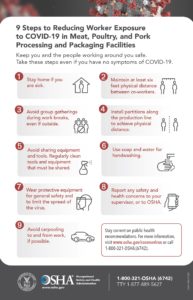 Over the last few months, multiple coronavirus outbreaks have been reported in meat processing facilities across the Unites States. Experts attribute frigid temperatures, cramped conditions and long hours as factors that accelerate the spread of coronavirus among workers in this industry.
Over the last few months, multiple coronavirus outbreaks have been reported in meat processing facilities across the Unites States. Experts attribute frigid temperatures, cramped conditions and long hours as factors that accelerate the spread of coronavirus among workers in this industry.
Industry Guidance
For this reason, the Occupational Safety and Health Administration (OSHA) and the Centers for Disease Control and Prevention (CDC) have released interim guidance specific to the meat and poultry processing industry.
The new guidance is intended to supplement, but not replace, the guidelines available from these websites:
- osha.gov/coronavirus
- https://www.cdc.gov/coronavirus/2019-ncov/index.html
- https://www.cdc.gov/coronavirus/2019-ncov/community/critical- workers/implementing-safety-practices.html
New Poster
OSHA has also published a new poster with safety tips employers in the meat and poultry processing industry can follow to help protect their workers from exposure to coronavirus. The poster is available in English (see below), Spanish and 15 additional languages.
Among other things, the new poster reminds workers to stay home if they are sick, practice social distancing, avoid sharing equipment and tools and follow good hygiene habits.
This new poster is not required, but should be considered by employers in the meat processing industry as another tool to help promote worker safety in the workplace.
Experts believe that frigid temperatures, cramped conditions and long hours accelerate the spread of coronavirus in meat processing facilities.
Factors Affecting Exposure
Workers are not exposed to coronavirus through the meat they handle, but rather through factors in their work environment, such as:
- Distance between workers on processing lines
- Long work shifts (lead to prolonged contact)
- Shared tools, equipment and spaces (work stations, break/locker rooms, transportation)
- Frequent community contact
This Legal Update is not intended to be exhaustive nor should any discussion or opinions be construed as legal advice. Readers should contact legal counsel for legal advice. ©2020 Zywave, Inc. All rights reserved.



